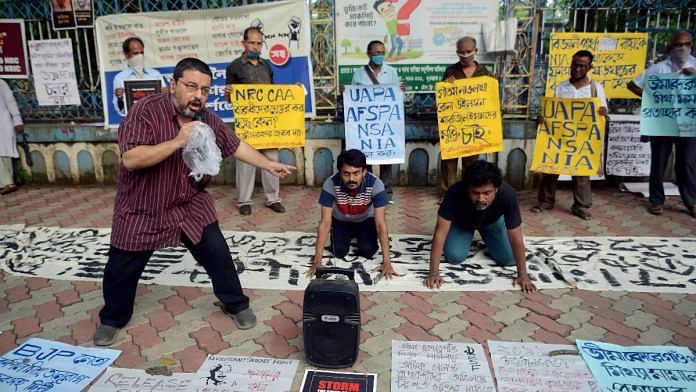India is an idiosyncratic democracy. Our cultural syncretism is a lesson for the world. Given that we live with many different cultures, the occasional stray incident shouldn’t take the limelight away from the larger picture.
India’s religious syncretism, which stands the test of time, was primarily a result of a unified spirit and feeling of patriotism and thirst for freedom. People realised that they needed to move over their cultural, ethnic, religious, and community boundaries to stand together for the idea of a “Free India”.
Even though the British did grave damage to our religious syncretism, we still largely believe in the concept of ‘Unity in Diversity’, which strongly supports my opening statement.
The platform of free India is meant to be one where different ideas and thoughts can be expressed by diverse people across the stretch of our society.
But can we still say the same about today’s India? Do we still have a democratic space to express our ideas freely, and discuss things rationally?
Many such fundamental questions exist that we don’t seek answers for, largely because we don’t have time or we have already chosen one side.
You’re either pro-Modi or anti-Modi
If you have studied about types of machines or levers in school, you must be familiar with Type-1 levers, where the fulcrum is in the middle.
Today, India doesn’t have a fulcrum to balance the Left and the Right. Debates are dead. Narratives are replacing debates. Though the two sides continue to draw swords at each other’s necks every now and then, the fundamental problem lies in the fact that both sides have already made up their mind: You can either be pro-Modi (hardcore Right-wing or Modi-bhakts) who enjoy the domestic electoral power, or you can be a part of the liberal anti-Modi club (hardcore Left-wing or Modi-haters) who enjoy global intellectual power.
The question asked today is not about what is right or wrong, but “which side do you support?” This can be backed by the fact that humans tend to think in binaries — yes or no, good or evil. Being on a side gives us a sense of settlement, relaxes our thought process and understanding to analyse both sides comprehensively.
Do we find comfort in being a leftist or a rightist instead of being a centrist? Does every serious issue in India need to pass the Modi-litmus test? Why do global intellectuals keep lecturing India without acknowledging the good? Why do pro-Modi people not acknowledge the flaws in the current regime and work towards a constructive solution?
These are some of the questions that need to answered.
Let’s look at some examples. The Freedom House report and Sweden’s V-Dem report are both from very famous and reputed institutions and both of them downgraded India on the democracy scale.
While the government denies these reports, indicating they are biased, the anti-Modi fans have held these reports up to ask some serious questions on institutional freedom, human rights and election transparency in India.
Some questions do persist regarding their scoring methods. While one report puts us as autocratic as Pakistan, the other puts even Hong Kong above India (very ludicrous).
Hence, neither can we completely rule out the reports nor can we accept them in totality.
India is right and wrong together
The pro-Modi and anti-Modi clubs have been on the extreme ends of the spectrum on other issues as well.
For instance, the farmer protests made global headlines. One can see this situation in two ways and then weigh them — the government tried to silence the farmers and disintegrate the protest, without predicting the backlash or the farmers stood their ground, bringing in opposition voices on the issue, which is a vital and healthy sign of a vibrant democracy.
It is only when we go into intricate details that we understand the behind-the-scenes of the opposition support or the government suppression of protests.
The government has also done many things right, with its road infrastructure push, the #HarGharNalSeJal mission, global diplomacy, etc., and deserves due credit for the same.
One can also identify that the government has a problem accepting criticism from domestic and international bodies or individuals, but at the same time, it accepts international accolades with open hands.
India is both right and wrong together, like any other country, and as citizens concerned about India, we must spend time researching before forming our opinion on anything. We should carefully assess our privileges, and try to ensure that we speak up for everything that’s wrong, from a centrist stand.
Arghyadeep Das is a student of K.J. Somaiya College of Engineering, Mumbai




“Does every serious issue in India need to pass the Modi-litmus test? Why do global intellectuals keep lecturing India without acknowledging the good? Why do pro-Modi people not acknowledge the flaws in the current regime and work towards a constructive solution?”
Not sure this is accurate, nor fair. The real issue is closed-mindedness. Just as some Modi supporters are unable to accept this government’s failures, there are Modi-haters who are unable to accept its successes.
Very thoughtful article.